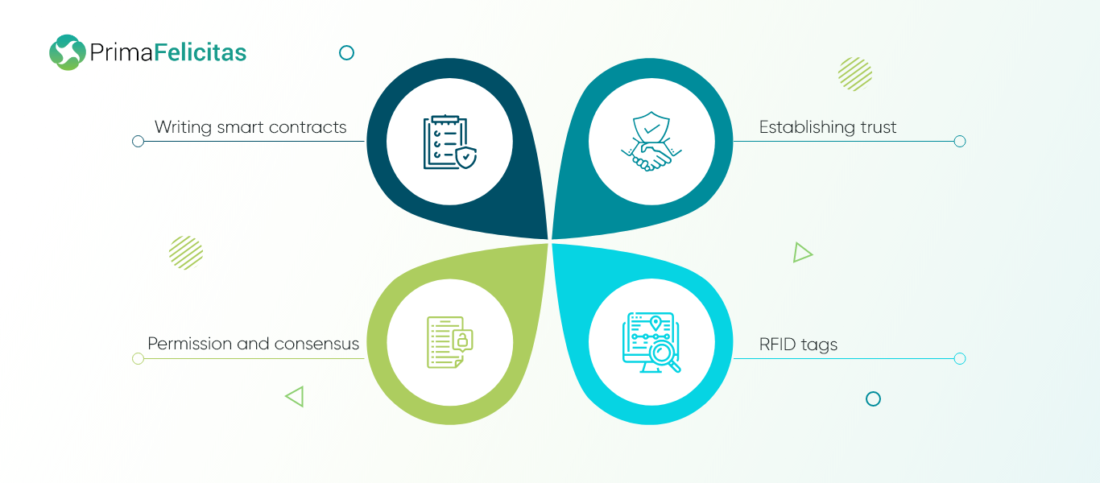[ad_1]
When it comes to understanding the potential of blockchain technology, one thinks about cryptocurrency, but the technology has gained attention from those outside finance. The core technology of blockchain is the decentralized ledger, which protects and records transaction data shared among several parties. The virtual currencies including Bitcoin, Dogecoin, and Ethereum leverage blockchain use blockchain to theoretically allow infinite and anonymous participants to perform transactions without any intermediary.
However, in supply chain management, the prime focus is on allowing a finite number of participants to conduct transactions with one another without compromising security and contract compliance. Moreover, supply chain blockchains tokenize the transaction-related data such as purchase orders, bills of lading, and inventory units. As every participant has a unique digital signature to move through the chain, it has difficult to tamper with transactions.
Blockchain technology offers a lot of opportunities for industries and companies that need quick and efficient access to inter-organization data due to its decentralized access mode. Supply chain management can be benefited from the integration of blockchain technology. Thus, several blockchain solutions are being tested, used, or piloted by companies to optimize their supply chains. According to Allied Market Research, the global blockchain supply chain market is projected to reach $9.85 billion by 2025, registering a colossal CAGR of 80.2% from 2018 to 2025. Blockchain has the potential to disrupt the traditional supply chain management methods and brings transparency, integrity, and availability of transaction data in the supply chain.
What is a supply chain and how complicated it can be?
A supply chain refers to a set of processes, regulations, tools, and participants involved in delivering physical goods from their origin to the destination. The supply chain is a vital element in the business model of retail operations, commodity trading companies, retail operators, manufacturers, among many others. Supply chain management is a complex process due to several reasons such as:
- Multiple supply chains span several jurisdictions including the involvement of multiple countries and states with federal systems. These supply chains can be cross-border in nature which means they deal with customs and border control. These procedures must comply with border and customs regulations which can change with little notice and can be extremely bureaucratic.
- Today’s supply chains involve a variety of participants including original manufacturers, resellers, distributors, warehouse operators, customs authorities, transportation companies, and retail stores. Developing trust between each participant is a time-consuming and costly endeavor. Thus, there is a need to check actual information entered the supply chain software and the reality of shipped goods.
- Due to the involvement of multiple parties and jurisdictions, there is a need for detailed documentation. Updating and verifying the information is a time-consuming task.
Modern supply chain management relies on software companies such as Oracle and SAP, which has simplified the management drastically. Despite the availability of cloud-based solutions, the issue of trust, the tiresome task of verification and validation remains. Moreover, supply chain management and operations are still complex, slow, and bureaucratic. Thus, the integration of blockchain in supply chain management was welcomed by several companies.
How blockchain can transform supply chain management?
Blockchain technology gained attention by several sectors other than cryptocurrency and is cited to be essential to simplify supply chain operations. Blockchain technology can offer unified and secured access to all parties throughout the supply chain to update, record, and view supply chain data. The use of blockchain provides an improved way of verifying data authenticity, which makes it easy to establish trust between different parties. If the supply chain includes cross-border transactions and government entities such as customs become its part, blockchain technology can help eliminate delays at borders and naval ports.
There are some key benefits of using blockchain in supply chain management:
- Improved efficiency: The supply chain management relies on shared network infrastructure and blockchain technology to improve communication and collaboration between all participants. The blockchain in the supply chain creates greater traceability and transparency while eliminating the threat of duplicate orders, invoice fraud, and unaccounted spending. Moreover, the technology offers easy financing options for small organizations.
- Higher savings: The blockchain in the supply chain helps reduce waste, stock loss and improves efficiency. The distributed network enables to sharing of transactions digitally with all involved parties, eliminating the need for paper-based transactions and operations, which further improves cost-effectiveness and reduces dependency on resources.
- Ethical and sustainable sourcing: Blockchain in the supply chain offers extreme transparency and traceability which makes validation of goods easier. Moreover, it is easy to monitor where the goods come from and where they go through the supply chain. What’s more, it offers information regarding which parties had access to goods and materials throughout the travel.
- Step toward digital transformation: Blockchain technology is easy to integrate with other state-of-the-art technologies such as IoT and process automation through the use of RFID tags and smart sensors. In short, it improves the overall functionality, accuracy, and visibility of every process involved during the journey.

Applications of blockchain in the supply chain:
A smart contract program uses blockchain technology to execute the agreement. One can include smart contracts in supply chain management to prevent unwanted interference and fraud. It is a software program that leverages blockchain technology to fulfill the agreement. As the program is stored on the blockchain, the smart contract can only function according to its programming and given attributes.
Smart contracts contain information regarding which parties can act on the specific type of data and restricts other parties from getting involved in certain transactions. Blockchain-based applications improve automation in processes.
If you are remotely involved in any supply chain operations, you know how difficult and costly establishing trust between parties really is. However, blockchain in the supply chain could make the entire process hassle-free. In a blockchain-based supply chain, every party has a copy of a ledge and knows where the goods originated. Thus, every party has access to information about the owner of the goods and their destination of it. Major companies such as Nestle have, therefore, already invested in a blockchain-based supply chain to monitor the provenance of food ingredients in several products.
Apart from this, blockchain offers customers a way to see the provenance of goods from their source point to the end user. This helps establish trust between the brand and the audience.
- Permission and consensus:
Blockchain is a system of records aimed to capture proof of monitory transactions such as bills of lading. Moreover, it covers every stage of the supply chain from serialization to receiving and even installation. Every step of the way the goods are tracked automatically. Thus, it is easier for brands to build their business based on trust, audibility, and transparency. More importantly, every participant has the same information. Therefore, if one party endeavors to perpetrate fraud, the party can automatically be out of sync with other systems and can be easily accounted for.
Currently, companies widely use RFID tags to store and track information about goods in supply chains. Usually, these tags are automatically processed by IT systems and used for smart contracts. RFID tags for pallets and cartons contain information regarding the location and date of delivery of the goods, which logistical parties can use with the help of specific apps. Moreover, a smart contract can easily monitor the final delivery performance of the parcel.
Blockchain gaining traction in the supply chain:
Modern supply chains are complex and intertwined. Getting goods from one location to a destination used to be easier a few decades ago as they used to perform every operation location. However now, the process involves endless involvement and investment. While establishing trust has always been difficult, it has become next to impossible with globalization and digitalization. However, blockchain in the supply chain certainly helps simplify various complex operations. Moreover, it offers accountability and transparency which is vital for any brand to maintain a relationship with its customers. The key benefits of blockchain in the supply chain include data security, use of external blockchain oracles, unified access to shipment data, security of data quality and integration, and reduction in bureaucratic delays.
While these benefits are alluring to many, the integration of blockchain in the supply chain is hindered due to several factors. The complexity and demand for IT infrastructure are among the few. Moreover, getting all parties on board with this new technology is a challenge. However, several companies have heavily invested in the technology, and some companies are willing to try it for a few operations before implementing it on a larger scale. The retail giants such as Walmart and other companies such as IBM and BHP are forerunners in this market and have encouraged other companies to follow their steps in the adoption of the blockchain-based supply chains in their business operations.
While Bitcoin brought blockchain technology into the world, business operations gained a vital tool to improve their processes and meet customer demands. Enhancing efficiency and offering transparency and traceability is an important aspect of a supply chain. Blockchain technology has proved that it has the unique potential to gain better control and visibility into the supply chain compared to any other tool available.

Swamini Kulkarni holds a bachelor’s degree in Instrumentation and control engineering from Pune University and works as a content writer at Allied Market Research. She is deeply fascinated by the impact of technology on human life and loves to talk about science and mythology. When she is not glued to the computer, she loves to read, travel and daydream about her areas of interest.
Looking for help here?
Connect with Our Expert for
a detailed discussion
Post Views: 111
[ad_2]
Source link


